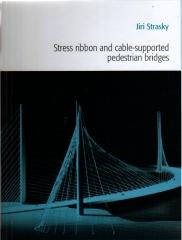'Stress-ribbon bridges' is the term used to describe structures formed by a very slender concrete deck in the shape of a catenary. They can be designed with one or more spans and are characterized by successive and complementary smooth curves.
These curves blend into the natural environment and their forms, the most simple and basic of structural solutions, clearly articulate the flow of internal forces which can be erected without undue pressure on the environment.
Stress Ribbon and Cable-supported Pedestrian Bridges looks at how slender concrete deck are used in the design of suspension and cable stayed structures. It looks at their characteristic feature; their rigidity, which is mainly given by the tension stiffness of prestressed concrete decking, so much so that movement caused by pedestrians or wind does not register as discomfort by users. Starting with a brief history the title describes structural types, addresses general design criteria, current technology, static and dynamic analysis and discusses the results of the static and dynamic loading tests. Illustrated throughout, Stress Ribbon and Cable-Supported Pedestrian Bridges provide examples of outstanding structures, which have been recently completed.
This book will be of value to practising engineers who wish to understand the premises upon which the rules are based and researchers who wish to develop the subject further and students who wish to delve into the background behind the current loading rules.

(0 Comentarios)